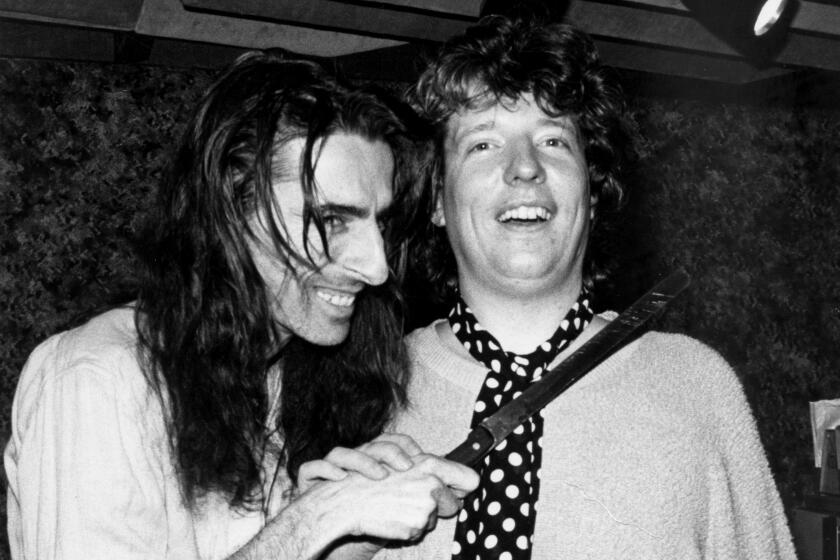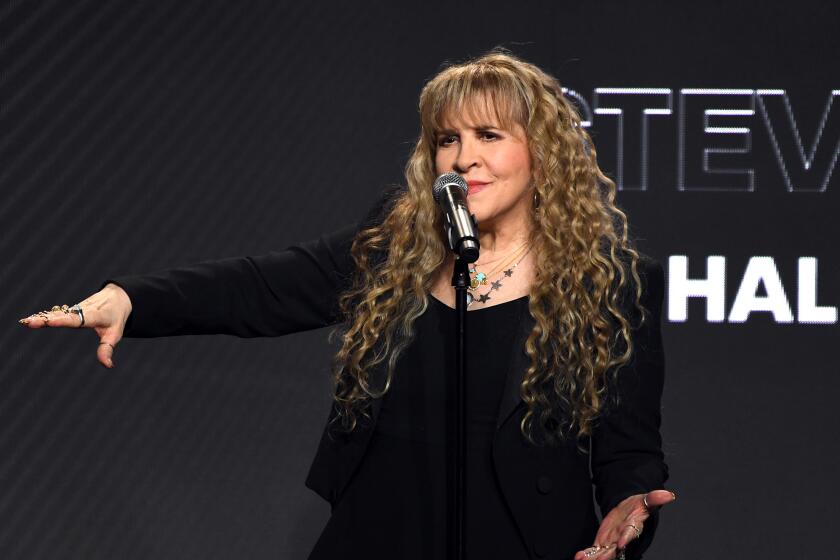RAP--VOICE OF SOCIAL RESPONSIBILITY
- Share via
Yo, right now, kick the bass for them brothers and let them know what goes on.
--Public Enemy
Do you know what time it is?
--Kool Moe Dee
Pardon the pun, but rap music is getting a bum rap. The swaggering, street-spawned sound has become even more controversial in recent months than that old adult target heavy metal, which was accused of promoting everything from Satanism to drugs.
It has been suggested that the lyrics of many rap hits, and/or the aggressive behavior of many rap groups--from Run-D.M.C. to the Beastie Boys--encourage violence, drug abuse and sexual promiscuity.
While rap does have some rough edges, the majority of rap performers actively promote social responsibility. Though rap is associated with ghetto life, many of the genre’s stars are intelligent, middle-class and politically aware. They see their music as an effective means of influencing young people.
“Stay in school” is a refrain heard at virtually every rap concert, and anti-crack records are now so plentiful as to be almost cliched: The Masters of Ceremony’s “Cracked Out,” Frick & Frack’s “Shouldn’t Have Did It” and Boogie Down Productions’ “The P Is Free But the Crack Costs Money,” to name but a few.
Safe sex is also a topic of interest. Kool Moe Dee’s “Go See the Doctor” tells a story, in explicit language, of the contraction and consequences of a sexually transmitted disease. Controversial in America, the song is used as a public service message in Germany.
“As an artist I have the attention of a lot of the younger kids,” says Kool Moe Dee, the Harlem rapper whose debut album, “Kool Moe Dee,” has made a strong showing on the black chart. “It’s a duty to say something worthwhile, rather than just get up and talk about sneakers and dancing all the time. Rap is an album market now rather than just a singles market, so you have the opportunity to branch out a little. You can expand and really talk about more things in depth, including lots of social issues.”
Bill Stephney, vice president of Def Jam, rap’s leading label, points to the life experience of today’s urban teen. “Crime, teen-age pregnancy, drugs, unemployment, are all part of daily life. Society’s institutions are trying to deal with older people, the baby boomers. Today’s teen-agers are disenfranchised, and rap is their music. Now they have a voice, so they’re talking about today’s problems and solutions.”
Brooklyn rap group Stetsasonic recently completed “A-F-R-I-C-A,” an anti-apartheid rap record to benefit the Africa Fund. The single was just released on pioneering hip-hop label Tommy Boy Records, and it’s part of a larger public education documentary project about Jesse Jackson’s 1986 visit to South Africa’s front-line states. The long-form documentary includes an introduction by Bill Cosby. Stetsasonic’s commitment to the cause goes beyond the record: They frequently appear at South Africa-related rallies.
Stetsasonic’s Kareem Daddy-O (ne Glen Bolton) asserts that rap music is the best way to reach kids. “They wake up with their boxes (tape players), they go to school with their Walkman, and they come home to pick up their big box and walk the streets with it. They live by this music. If they could be given something that’s good enough, and that’s real enough-- there’ve been message records before, but they haven’t felt like hip-hop. A lot of people get in and they let bass players and trumpet players and such play on the track, and it doesn’t sound like anything a kid would like.
“We thought, if we’re going to do this as a street project, if we’re going to do this for kids to understand, then we’re going to have to have a catchy chorus, and humor, and it has to sound street .
“If black youth were to understand the situation in southern Africa, they might do something in the long run to help (the situation). We performed at a rally in Washington in April for 125,000 people. We performed at the Operation Push reception in Chicago for Oliver Tambo (President of the African National Congress). It was one of the first times we’ve seen people from the ages of 8 to 80 boogieing to a rap song, and understanding at the same time. Gray-haired people clapping their hands, little kids, and everything in between.”
Social conditions in America make up the subject matter of Public Enemy’s songs. Def Jam’s newest stars’ “Yo! Bum Rush the Show” LP is a major hit on the street--with virtually no air play they’ve achieved sales figures to rival those of Top 40 pop records. Each song addresses serious issues, and Public Enemy’s view of the world is a harsh one.
College-educated lyricist/lead rapper Chuck D. grew up in the ‘60s aware of his times. He was strongly influenced by the Black Panther movement and various civil rights actions. The songs he writes for Public Enemy approach consciousness-raising on a general level; his interest is in increasing political awareness on issues affecting the daily lives of his audience.
“I deal with the young black American male. That’s what (the name) Public Enemy represents: That’s how he’s looked at and treated by society. On ‘You’re Going to Get Yours’ I talk about a pack of homeboys and their love for the Oldsmobile 98. They’re looked at as gangsters. Cops’ll stop a kid with a nice-looking car if he’s black, no question, and start quizzing him because he’s suspicious.
“I have an obligation (to educate) because I’m aware. Each one teach one. We’re at a time when the black community is getting kind of lazy and slack and we’re moving backwards, so I have to try to turn this around.
“I’m not getting radio play because my issues are strong. A realistic black radio format now would be 20 to 25% rap music, because it’s the music of the youth. But black radio has turned its back on rap, they want to play it safe. I’m not about making safe records.”
More to Read
The biggest entertainment stories
Get our big stories about Hollywood, film, television, music, arts, culture and more right in your inbox as soon as they publish.
You may occasionally receive promotional content from the Los Angeles Times.










